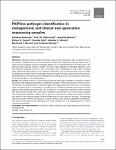PAIPline: pathogen identification in metagenomic and clinical next generation sequencing samples
Andrusch, Andreas
Dabrowski, Piotr Wojtek
Klenner, Jeanette
Tausch, Simon H.
Kohl, Claudia
Osman, Abdalla A.
Renard, Bernhard Y.
Nitsche, Andreas
Motivation:
Next generation sequencing (NGS) has provided researchers with a powerful tool to characterize metagenomic and clinical samples in research and diagnostic settings. NGS allows an open view into samples useful for pathogen detection in an unbiased fashion and without prior hypothesis about possible causative agents. However, NGS datasets for pathogen detection come with different obstacles, such as a very unfavorable ratio of pathogen to host reads. Alongside often appearing false positives and irrelevant organisms, such as contaminants, tools are often challenged by samples with low pathogen loads and might not report organisms present below a certain threshold. Furthermore, some metagenomic profiling tools are only focused on one particular set of pathogens, for example bacteria.
Results:
We present PAIPline, a bioinformatics pipeline specifically designed to address problems associated with detecting pathogens in diagnostic samples. PAIPline particularly focuses on userfriendliness and encapsulates all necessary steps from preprocessing to resolution of ambiguous reads and filtering up to visualization in a single tool. In contrast to existing tools, PAIPline is more specific while maintaining sensitivity. This is shown in a comparative evaluation where PAIPline was benchmarked along other well-known metagenomic profiling tools on previously published well-characterized datasets. Additionally, as part of an international cooperation project, PAIPline was applied to an outbreak sample of hemorrhagic fevers of then unknown etiology. The presented results show that PAIPline can serve as a robust, reliable, user-friendly, adaptable and generalizable stand-alone software for diagnostics from NGS samples and as a stepping stone for further downstream analyses.
Availability and implementation:
PAIPline is freely available under https://gitlab.com/rki_bioinformatics/paipline.
Files in this item

